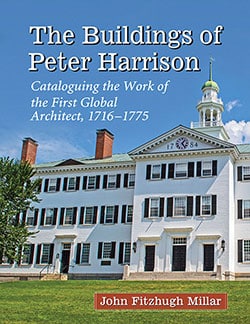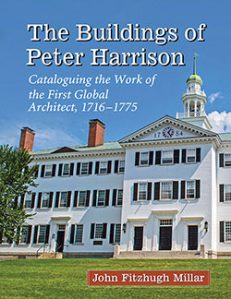The Buildings of Peter Harrison
Cataloguing the Work of the First Global Architect, 1716–1775
$75.00
In stock
About the Book
Perhaps the most important architect ever to have worked in America, Peter Harrison’s renown suffers from the destruction of most of his papers when he died in 1775. He was born in Yorkshire, England in 1716 and trained to be an architect as a teenager. He also became a ship captain, and soon sailed to ports in America, where he began designing some of the most iconic buildings of the continent. In a clandestine operation, he procured the plans for the French Canadian fortress of Louisbourg, enabling Massachusetts Governor William Shirley to capture it in 1745. This setback forced the French to halt their operation to capture all of British America and to give up British territory they had captured in India. As a result, he was rewarded with commissions to design important buildings in Britain and in nearly all British colonies around the world, and he became the first person ever to have designed buildings on six continents. He designed mostly in a neo–Palladian style, and invented a way of building wooden structures so as to look like carved stone—“wooden rustication.” He also designed some of America’s most valuable furniture, including inventing the coveted “block-front,” and introducing the bombe motif. In America, he lived in Newport, Rhode Island, and in New Haven, Connecticut, where he died at the beginning of the War of Independence.
About the Author(s)
Bibliographic Details
John Fitzhugh Millar
Format: softcover (8.5 x 11)
Pages: 244
Bibliographic Info: 135 photos and illustrations, appendices, glossary, bibliography, index
Copyright Date: 2014
pISBN: 978-0-7864-7962-7
eISBN: 978-1-4766-1574-5
Imprint: McFarland
Table of Contents
Table of Contents
Preface 1
I. Carl Bridenbaugh’s Account of Harrison 5
II. A New Narrative of the Life of Peter Harrison 10
III. The British Isles and Europe 32
IV. Canada 57
V. New England 70
VI. The Mid-Atlantic 112
VII. The American South and Atlantic Islands 144
VIII. The Caribbean 174
IX. Other Continents—South America, Africa, Asia and Australasia 190
X. Furniture 202
Appendices
A—Buildings Attributed to Harrison 209
B—Student to Teacher 214
C—Architectural Pattern Books in Harrison’s Library 215
Illustrated Glossary of Architectural Terms 217
Bibliography 227
Index 229





